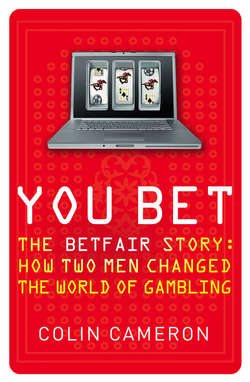Читать книгу You Bet: The Betfair Story and How Two Men Changed the World of Gambling - Colin Cameron - Страница 10
Chapter THREE
ОглавлениеILLUSIONS OF CONTROL
Why do we bet? To a gambler, this is not so much a question as an invitation. Ask, and in no time odds against well-worn theories would be chalked up somewhere, including the basis for gambling is a desire to lose everything in order to test the unconditional love of a father. It would be odds-on that a good few of them would also feature something about maternal relations, too.
Sigmund Freud on betting would not be anywhere near favourite these days. To summarise his theory, gambling is a form of masturbation would be an extremely simplified précis. Even in full, academics dwell little on these notions today. In a book published in 1995 and titled Adolescent Gambling, by Mark Griffiths, professor of gambling at Trent University, he outlined a host of more contemporary explanations behind the subconscious desire to bet. These largely focus on the part of the population – between 0.2 per cent and 1 per cent, according to experts – that are reckoned to be pathological gamblers.
Griffiths, himself, has a taste for casinos. This is leisure time, he reasons, which, along with other distractions, he ‘buys’ by exposing himself potentially to financial losses. In other words, time and money spent at the tables incurring inevitable losses is no different to that spent watching Nottingham Forest, his other passion, having splashed out comparable amounts of cash on a match ticket. Professionally speaking, Griffiths is not short of subject matter in the shape of the world’s many gamblers to analyse in addition to the pathologically challenged who are the focus of much specialist work. National surveys of betting habits almost universally conclude that in the Western world there are more gamblers than nongamblers. Estimates of the proportion of Britain that bets in some form or other vary from 80 per cent to 94 per cent of the adult population, with up to 68 per cent of Americans and as many as 92 per cent of Australians sharing in the habit. In the UK, recent estimates suggest that, on average, citizens each bet £800 a year with a quarter of all turnover staked on the Internet. All this before even considering Asia.
That a majority in most countries bet, fits in with a conclusion to some of the research undertaken by Emmanuel Moran, published in 1970, one of a number of scholars referred to by Griffiths in his compelling book. He found that gambling flourishes because of the pressures on those to bet, who find themselves among other risk takers. In other words, peer pressure is a big factor in gambling. Other factors unearthed in what compels us, overall, to have a bet include the desire to release stress and tension. This may puzzle those who find a bet achieves the exact opposite. Each to his own.
According to Griffiths, Owen Wolkowitz, Alec Roy, and Allen Doran published work in 1985 that supported the theory that most gambling habits have their roots in adolescence. These desires are then kick-started by an adult shock such as a death or birth. A year earlier, Henry Lesieur and Robert Custer identified phases in escalation of gambling habits; the winning phase, the losing phase, and the desperation phase for those who develop a fullblown addiction. Various views exist on what each of these phases involve. Suffice to say that one school of thought claims to have unearthed a fourth relevant period; the hopeless phase. Reputedly, this is gambling for gambling’s sake. The research behind this touched on ‘laboratory animals with electrodes planted in their pleasure centres, they gamble to the point of exhaustion’. A word of warning, there, if ever there was one.
Back to Freud: we should note that his theorising on gambling was based primarily on one patient’s experiences, whom the good doctor is reputed never actually to have met. (Edmund Bergler, whose idea that gambling is simply guilt relief in losing is rated more credible today, did at least have 200 cases to consider in his research in the 1950s.) So Freud’s analogies between betting and masturbation – impulses, promises to stop often broken, guilt on completion – probably deserve, along with plenty of other Freud musings, to end up discarded. Certainly they are currently discredited along with much of Freud’s other work. Back in 1920 Georg Simmel gave them more credence than they might expect today, equating a bet with foreplay and winning with orgasm. Losing akin to ejaculation? Apparently. Well, I never.
